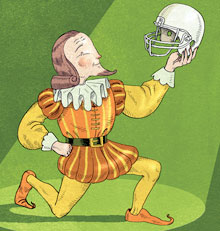Stage Craft: Taking Cues from Theater Class to Help Make Math and Science Fun
Why can’t a classroom have the passion of drama or sports?
Your content has been saved!
Go to My Saved Content.
I recently had a chance to read an article by Herb Childress called "Seventeen Reasons Why Football Is Better Than High School." The ethnographer spent a year observing students in a high school, noting the contrast between their boredom and discontent in the classroom and their joy and success on the playing field. Quite a few of the reasons he lists resonated with me as a high school teacher and drama director. In football, he wrote,
- Players are considered active participants rather than passive recipients.
- The unexpected happens all the time, so there's no time to coast or be unfocused.
- A player can let the team down.
- There's no such thing as "good enough"; we're always asking players to excel.
- The adults who participate are genuinely interested.
- A public performance is expected.
I think I'm a pretty good math and science teacher, but the skills that I see students develop when I direct a theatrical production seem to go deeper. Maybe that's because theater is a lot like football. Students must memorize their lines, the blocking, a repertoire of songs and dances, and the many nuances of the characters they portray. When the curtain rises on opening night, it's all up to them. It's their production. And the unexpected happens all the time: Sound recordings don't work, lights go on the fritz, props break, doors jam, people forget their lines or miss an entrance, and there are wardrobe malfunctions. Actors must be alert and able to adjust to surprises.
As in football, the stakes are high. One actor or technician can let the entire cast and crew down, and, as in football, "good enough" isn't good enough. There's always something to be tweaked in a performance, something to be perfected, skills to be improved.
All of these demands give students tremendous life lessons about teamwork and the rewards of hard work. Students learn that what looks effortless on stage is really the result of a lot of sustained effort. In sports, and in the theater, what the student is doing is real, about as real as it gets. And if it's seen as real, it can provide the opportunity for active engagement and effective learning.
Don't get me wrong: I believe firmly in the value of academics. It's important to know how to write lab reports, use the quadratic formula, and interpret the Constitution. But in the classroom, just as on stage or on the field, for real learning to occur, there has to be some desire on the part of the learner, and a significant part of that desire comes from the relevance of the material. When I sit down to create curriculum for my math and science courses, I've challenged myself to make my students' experiences just as real and meaningful as my actors' experiences on stage.
In my environmental science course, for example, this means testing the creek water in the school's backyard. It's very rewarding when students read the E. coli levels in water samples and say, "We need to do something about the water quality!" This is real learning with a lifelong impact.
It's more challenging to "keep it real" in math class, but still possible. One approach is to have my math students run an experiment for which they gather data, analyze the statistics, and then graph the results to determine the equation of the lines. Students see firsthand that working with numbers in real life is much messier than solving problems in textbooks.
I can already hear some of my colleagues: "Well, sure, your theater kids are happier. They're in your play by choice. Your math students have to be in class." And they're right. When we do something because we're forced to, our personal investment wanes (just think "income taxes").
It can be hard to find the motivation that leads to honest investment in a difficult task. But that is the teacher's responsibility: to create experiences for our students that make them active participants rather than passive recipients. With some creativity, flexibility, and research, it is possible. And it's also more fun -- for everyone. The teacher gets the gratification of seeing students develop life skills and confidence that will serve them for the rest of their lives. Students get to experience the excitement of discovery, the frustration of periodic failure, the camaraderie of teamwork, and the jubilation and pride inherent in giving a performance that has meaning.
Credit: Wesley Bedrosian